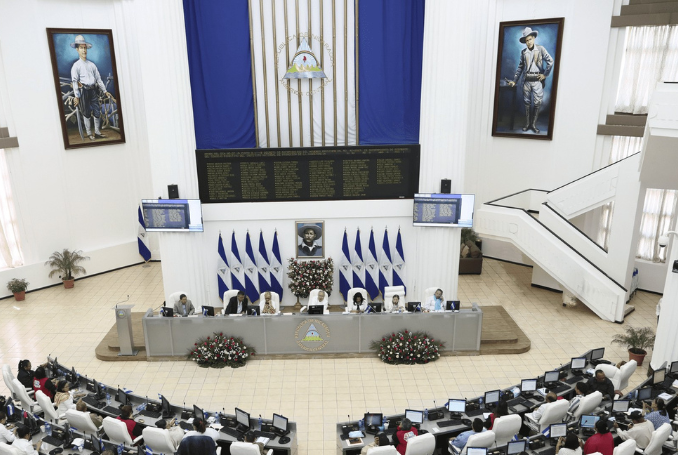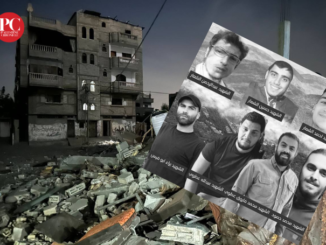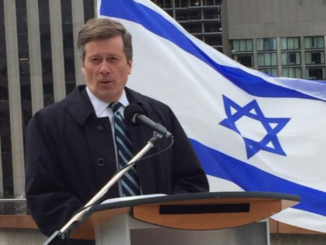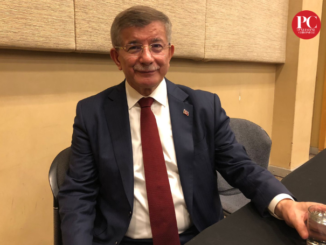
The government of Nicaragua has announced it is cutting diplomatic ties with Israel, further contributing to its increasing isolation on the international stage amid the ongoing genocidal war on Gaza.
Vice President Rosario Murillo made the announcement through state media on Friday, shortly after Congress passed a resolution advocating for action, which coincided with the first anniversary of the Gaza war on October 7.
Murillo explained that her husband directed the government to “sever diplomatic relations with the fascist and genocidal government of Israel.”
While the decision is mainly symbolic—given that Israel does not have a resident ambassador in Nicaragua’s capital, Managua, and formal ties between the two nations have long been minimal—it comes at a time when Israel faces increasing diplomatic criticism for its aggressive military operations in Gaza and across the broader Middle East, including Lebanon.
On Saturday, the Palestinian Ministry of Foreign Affairs expressed its approval of Nicaragua’s decision, stating it hoped it would “serve as a model to other friendly governments to take similar measures, as a means of holding Israel accountable for the genocide it is committing against the Palestinian people.”
Nicaragua denounced Israel’s military actions on Friday, arguing that the conflict “extends against Lebanon and gravely threatens Syria, Yemen, and Iran.”
In Latin America, opposition to Israel’s Gaza offensive has been notably strong, especially from left-leaning leaders. Countries like Brazil, Colombia, and Chile have emerged as vocal critics of Israel. On Friday, the Palestinian mission to the United Nations acknowledged that these three nations were instrumental in initiating a letter of support for UN Secretary-General Antonio Guterres, who was recently declared persona non grata by Israel.
Colombian President Gustavo Petro severed diplomatic ties with Israel in May, condemning Prime Minister Benjamin Netanyahu’s government as “genocidal.” That same month, Brazil’s President Luiz Inácio Lula da Silva recalled the Brazilian ambassador to Israel, comparing the Gaza conflict to the Holocaust.
Meanwhile, Nicaragua’s Ortega government had previously appealed to the International Court of Justice (ICJ) to stop German arms sales to Israel, though the court dismissed the case in April.
Nicaragua itself has experienced increasing diplomatic isolation in Latin America, as Ortega’s government continues to escalate repressive measures against political opponents and dissidents.
Ongoing Genocide
Flouting a UN Security Council resolution demanding an immediate ceasefire, Israel has faced international condemnation amid its continued brutal offensive on Gaza.
Currently on trial before the International Court of Justice for genocide against Palestinians, Israel has been waging a devastating war on Gaza since October 7.
According to Gaza’s Ministry of Health, 42,175 Palestinians have been killed, and 98,336 wounded in Israel’s ongoing genocide in Gaza starting on October 7, 2023.
Moreover, at least 11,000 people are unaccounted for, presumed dead under the rubble of their homes throughout the Strip.
Israel says that 1,200 soldiers and civilians were killed during the Al-Aqsa Flood Operation on October 7. Israeli media published reports suggesting that many Israelis were killed on that day by ‘friendly fire’.
Palestinian and international organizations say that the majority of those killed and wounded are women and children.
The Israeli war has resulted in an acute famine, mostly in northern Gaza, resulting in the death of many Palestinians, mostly children.
The Israeli aggression has also resulted in the forceful displacement of nearly two million people from all over the Gaza Strip, with the vast majority of the displaced forced into the densely crowded southern city of Rafah near the border with Egypt – in what has become Palestine’s largest mass exodus since the 1948 Nakba.
Later in the war, hundreds of thousands of Palestinians began moving from the south to central Gaza in a constant search for safety.
(PC, Agencies)








